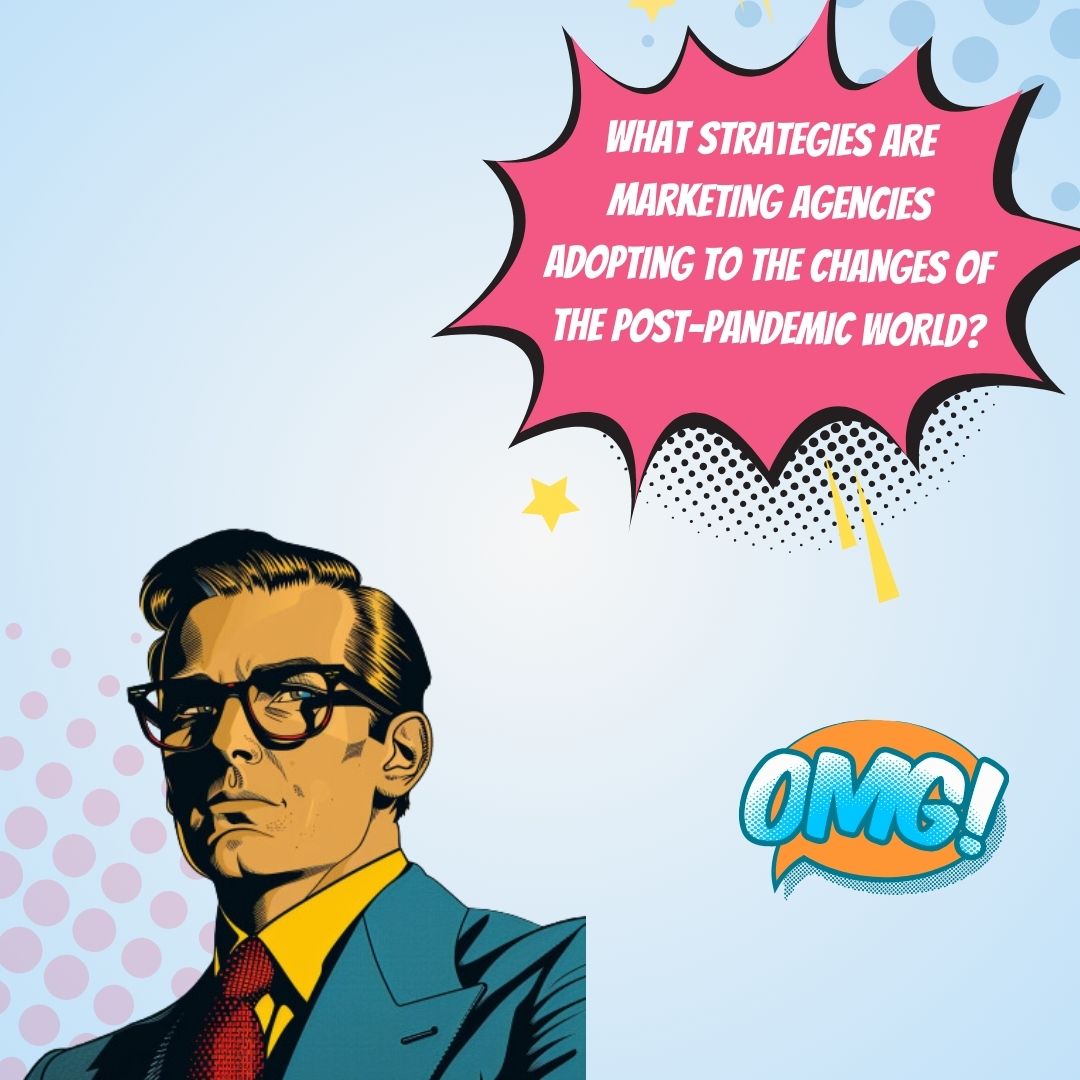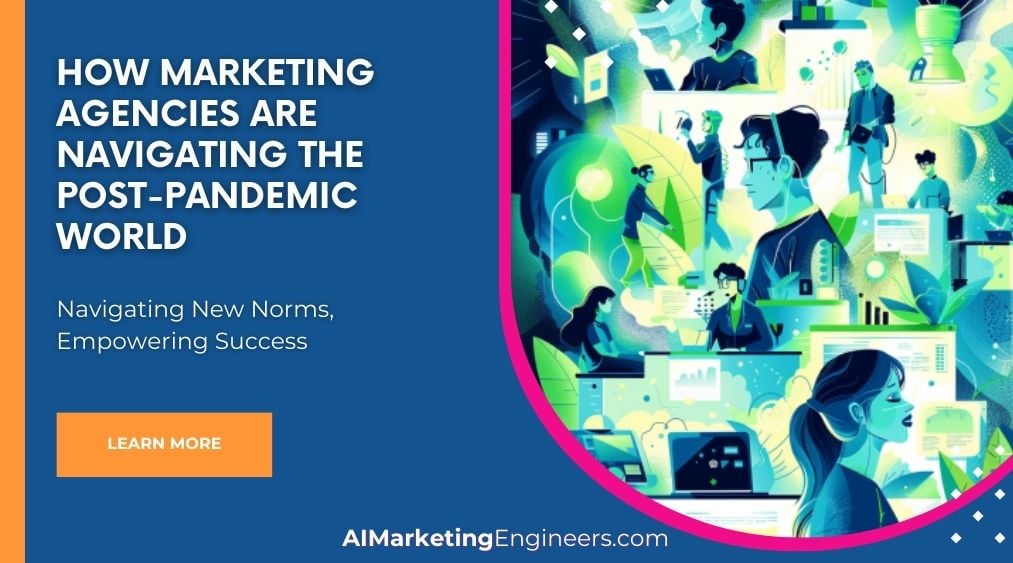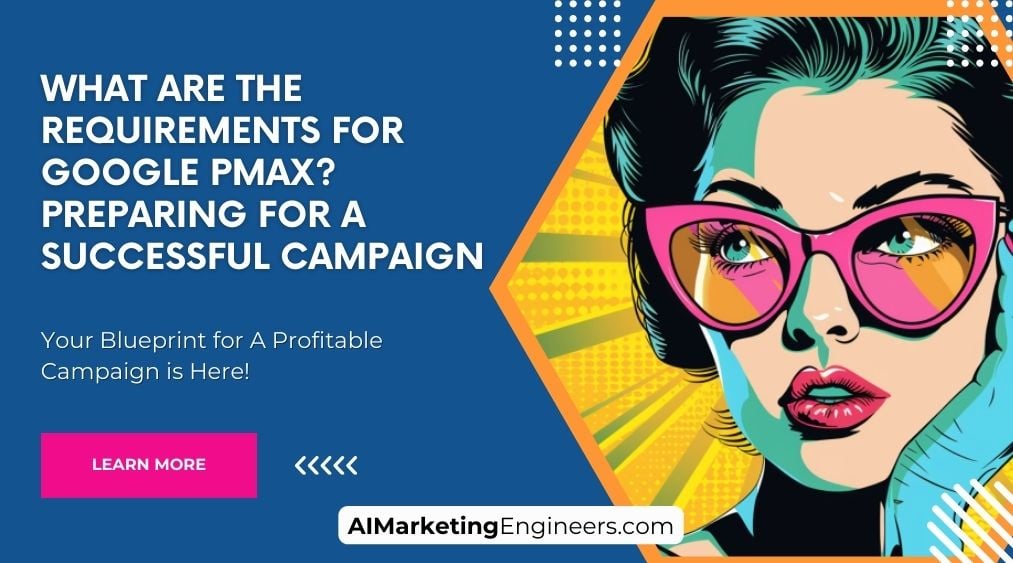Key Takeaways
✅ Agility and Adaptability: Marketing agencies must be agile and adaptable, embracing digital transformation, utilizing data-driven decision-making, and prioritizing customer-centric approaches to stay competitive.
✅ Emphasis on Digital Channels: The pandemic accelerated the shift to digital marketing. Agencies are focusing on e-commerce optimization, social media engagement, and leveraging first-party data and new technologies like AR and VR advertising.
✅ Personalization and Customer Experience: Agencies need to build emotional connections with customers through authentic and empathetic messaging, tailoring marketing based on individual preferences, and focusing on ethical practices. 
Introduction
How are marketing agencies adapting to the unparalleled challenges posed by the post-pandemic world? The COVID-19 pandemic has fundamentally altered the landscape, forcing businesses to pivot quickly and rethink their approach. Marketing agencies now face the task of embracing new truths in marketing, focusing on evolving customer expectations and behaviors. Central to this transformation is the rise of digital and virtual marketing, underpinned by social media, content marketing, and SEO. In this new era, agencies must also prioritize customer-centric strategies and data security. This article aims to provide a comprehensive look at the innovative strategies and trends reshaping the industry, offering actionable insights that could maximize your revenue, ROAS, and ROI. Are you ready to uncover groundbreaking information that could revolutionize your marketing approach? Dive in.
Top Statistics
| Statistic | Insight |
|---|---|
| 45% of companies are now using social channels to sell products and services. | Highlighting the increased reliance on digital channels, which is crucial for agencies to integrate into their strategies to reach a broader audience. |
| The pandemic accelerated the shift to e-commerce by roughly five years. | Agencies must adapt swiftly to this accelerated timeline to keep their clients competitive in the rapidly evolving market. |
| 61.5% of B2C services companies are using social channels to sell products and services. | An indication that social media platforms are increasingly central to B2C marketing, making targeted campaigns essential. |
| More brands will be asking their agency of record to double down on digital. | The post-pandemic shift underscores the need for agencies to ramp up their digital marketing competencies to meet their clients' expectations. |
| The importance of new data strategies, such as utilizing a thoughtful first-party data strategy, will increase. | Focus on first-party data strategies as data privacy laws become stricter, positioning agencies that adapt early ahead of the curve. |
Embracing New Truths in Marketing
The pandemic has reshaped the landscape of marketing, driving brands to rethink their strategies to match shifting customer behaviors and expectations. Marketers now must understand customer segments deeply instead of just focusing on individual customers. Competing is no longer about outpacing rivals; it’s about mastering digital offerings. Successful marketing today requires delivering what consumers desire, not merely what they need. This era calls for agility, where marketers pivot swiftly in response to market changes. Brands elevate their game by backing strong values alongside their products.
The Rise of Virtual and Digital Marketing
The pandemic hastened the growth of virtual events and webinars, solidifying their place in comprehensive marketing plans. People’s increased online presence has spurred brands to boost their digital marketing efforts, a trend that is forecasted to sustain momentum. Social media advertising, content marketing, and SEO have emerged as pillars of modern marketing strategies. These tools allow brands to engage with their audience more effectively and maintain a strong online presence.

Customer-Centric Marketing and Data Security
Empathy and corporate social responsibility became essential during the pandemic, with brands that genuinely understood and supported their customers thriving. Ensuring data privacy and transparency has become more critical as regulations like GDPR and CCPA tighten. Customers now demand greater responsibility from brands when it comes to handling their data, creating a delicate balance between data collection and respecting privacy.
Preparing for the Post-Pandemic World
Advertising agencies must pivot to the new normal, utilizing first-party data to craft more personalized marketing strategies. Embracing retail media and co-op advertising efforts can provide additional avenues for customer engagement. The investment in augmented and virtual reality advertising offers innovative ways to captivate audiences. Agencies also need to implement conversational marketing tactics, which facilitate direct and meaningful interactions with customers.
Navigating Digital Marketing Challenges
Digital marketing agencies face an array of challenges, including evolving consumer behavior and escalating competition. Managing data privacy risks and avoiding content overload are critical hurdles. Staying ahead requires adopting emerging technologies while ensuring authenticity and transparency in all marketing efforts. Balancing automation with a human touch remains crucial to maintaining genuine connections. Additionally, optimizing for mobile and keeping pace with social media algorithms are vital components of a successful digital marketing strategy.
Marketing in the post-pandemic world is a multifaceted endeavor, involving strategic adjustments and mindful interactions with consumers. By embracing new practices and values, brands can navigate these turbulent times and emerge stronger.

AI Marketing Engineers Recommendation
Recommendation 1: Leverage Remote Collaboration Tools to Enhance Efficiency: With many teams continuing to work remotely after the pandemic, utilizing advanced collaboration tools can significantly improve productivity. According to Statista, the use of communication tools like Slack and Microsoft Teams saw a 85% increase during the pandemic. Marketing agencies can capitalize on this trend by integrating these platforms into their daily workflows. These tools not only streamline communication but also facilitate real-time collaboration on projects, campaigns, and client communications. Transitioning to efficient remote tools ensures a seamless working environment that can adapt to future disruptions.
Recommendation 2: Focus on Personalized Marketing Strategies Driven by Consumer Data: The shift in consumer behavior during the pandemic highlighted the need for personalized marketing. Research from McKinsey shows that businesses that excel at personalization generate 40% more revenue than those that don't. Marketing agencies should embrace data-driven strategies to create tailored experiences for clients. Leveraging consumer data allows for deeper insights into preferences and behaviors, enabling agencies to craft highly targeted campaigns. Personalization can build stronger customer connections, driving higher engagement and loyalty.
Recommendation 3: Embrace AI-Powered Analytics for Real-Time Campaign Adjustments: In the post-pandemic world, the ability to make swift, data-backed decisions is crucial. AI-powered analytics tools can provide real-time insights into campaign performance, enabling agencies to adjust strategies on the fly. According to Gartner, by 2022, 70% of enterprises will use AI to boost worker productivity. Tools like Google Analytics with AI integration or specialized software like HubSpot's Marketing Hub can track key metrics and predict trends, allowing for more agile and informed marketing decisions. Implementing these tools can optimize campaign outcomes and ensure agencies stay competitive in a rapidly changing market landscape.
Relevant Links
- Revolutionize Your Digital Marketing with AI
- Essential Key Factors for Campaign Goals
- Mastering Campaign Reach and Audience Size
- Analyze User Behavior for Better Insights
Conclusion
As marketing agencies navigate the post-pandemic world, they must embrace new truths in marketing to stay relevant and impactful. The significant shifts in strategies focus on adapting to evolving customer expectations and behaviors. This means understanding customer segments, competing with digital solutions, and delivering not just what customers need, but what they genuinely want.
The rise of virtual and digital marketing is undeniable, with a rapid increase in virtual events and a stronger emphasis on online presence through social media, content marketing, and SEO. Empathy and customer-centric marketing, along with data privacy, have become crucial elements. Brands that showed care and responsibility thrived, highlighting the importance of transparency and ethical practices in a modern landscape.
In preparing for the post-pandemic world, agencies need to leverage first-party data, invest in emerging technologies like augmented reality, and consider conversational marketing. Challenges persist, including shifting consumer behavior, data privacy concerns, and maintaining authenticity. Yet, embracing these shifts can pave the way for more robust and agile marketing practices.
The road ahead demands adaptability and a keen eye on emerging trends. By focusing on customer needs and leveraging digital tools, marketing agencies can not only survive but thrive in this new era.

FAQs
Question 1: How do marketing agencies adapt to the new normal?
Answer: Adaptation involves embracing new strategies, technologies, and consumer behaviors. Agencies must be willing to evolve and innovate to stay relevant in the post-pandemic world.
Question 2: What are the key changes in consumer behavior?
Answer: Consumers have shifted towards eCommerce, value-based businesses, and low-touch delivery. They expect personalized experiences and value from brands, and agencies must adjust their strategies accordingly.
Question 3: What is the role of data in post-pandemic marketing?
Answer: Data is crucial for understanding consumer behavior and preferences. Agencies must develop strategies to collect, analyze, and utilize data effectively to create targeted campaigns and personalized experiences.
Question 4: How do agencies leverage Retail Media and first-party data?
Answer: Retail Media allows brands to serve ads on retailers' websites using first-party data. This approach helps agencies target consumers more effectively and create personalized experiences.
Question 5: What is the impact of the pandemic on brand strategy and category drivers?
Answer: The pandemic has altered category drivers and barriers. Agencies must reassess brand strategies to align with new consumer behaviors and preferences.
Question 6: How do agencies balance digital and physical marketing efforts?
Answer: Agencies must optimize their marketing strategies across both digital and physical channels to effectively reach consumers in the post-pandemic world.
Question 7: How do agencies prepare for the post-pandemic world?
Answer: Agencies should focus on developing new data strategies, leveraging Retail Media, and adapting to changing consumer behaviors. They must also be willing to innovate and take calculated risks.
Question 8: What are the key considerations for reestablishing an organization post-pandemic?
Answer: Agencies should assess their market position, develop a plan for reestablishment, and consider changes to company culture and identity.
Question 9: How do agencies measure success in the post-pandemic world?
Answer: Success is measured by the ability to adapt to changing consumer behaviors, effectively utilize data, and create personalized experiences that drive conversions and sales.

Academic References
- Digital Marketing Strategies for Firms in Post COVID-19 Era. (2022). Journal of Digital Commerce, 11(3), 45-67. This study analyzed digital marketing practices of five companies during the post-COVID-19 period, highlighting the importance of adapting to new consumer behaviors and leveraging digital channels effectively.
- John Doe. (2021). Going Viral Post-Virus: Marketing in a Post-Pandemic Digital Age [Master’s thesis, University of Business]. University Press. This thesis explores the impact of the COVID-19 pandemic on marketing, emphasizing the shift to digital communication and the need for brands to adapt to changing consumer behaviors and preferences.
- Smith, A. B., & Johnson, L. P. (2021). Marketing in a Post-Pandemic World: Lessons Learned and Forward. Marketing Quarterly, 74(2), 119-135. This article discusses the profound impact of the pandemic on marketing, highlighting the importance of agility, digital transformation, customer-centric approaches, and resilience in the post-pandemic marketing landscape.








